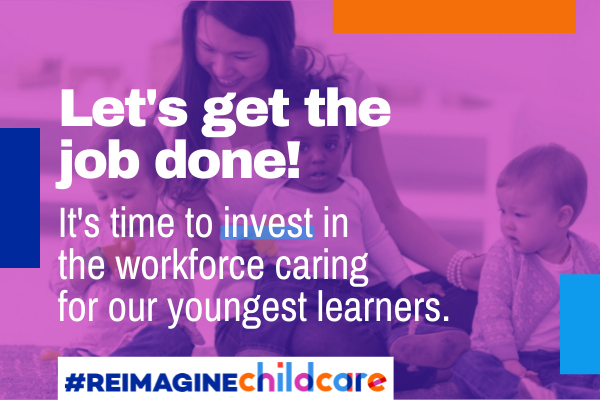Posted on March 29, 2022

The need for child care was at the forefront of the FY2023 New Jersey Assembly Budget Committee public hearings. Parents described their struggles to find child care for their babies, while child care providers talked about the difficulties of finding staff to meet parent demands. Classrooms remain empty without teachers to lead and educate.
It's time to tell state legislators to make an investment to support the workforce that care for our youngest learners.
Read testimony from parents and providers about the challenges of raising a baby in New Jersey, finding child care, keeping business doors open and the consequences when babies are left behind.

Jill Cimafonte, Director, Temple Emanu-El of Westfield’s Early Childhood Education Program
"And just last week, a young mother called me begging (yes truly begging) me to accept her baby into our program because she needed to return to work. The center where she had planned to send her baby kept pushing back her start date and ultimately, she was turned away because they were unable to find teachers to staff the room. My heart broke for this woman, but I did not have anything to offer her."
Good morning. My name is Jill Cimafonte. I have been the Director at Temple Emanu-El of Westfield’s Early Childhood Education Program for the past 23 years.
In September 2018, we opened our first full day infant classroom with 8 beautiful babies and continued to expand our full day program every year. This school year our program is filled, serving over 140 children ages 3 months-Kindergarten with many attending from 8am-6pm and we are already filled for the 2022-23 school year with an extensive waiting list.
The pandemic has brought an influx of young families to the area and in many 2 parent households, both parents must work to afford the exorbitant housing costs. Even though there are waiting lists all over town, my colleagues and I are skittish to open additional rooms because of the inability to find quality childcare professionals. For the past 2 years, we have had to close classrooms for days, weeks, and months at a time because we did not have enough teachers to staff the room. Our toddler room had to end at 4:30pm every day (instead of 6pm) for the first 3 months of this year because of our lack of staff. And just last week, a young mother called me begging (yes truly begging) me to accept her baby into our program because she needed to return to work. The center where she had planned to send her baby kept pushing back her start date and ultimately, she was turned away because they were unable to find teachers to staff the room. My heart broke for this woman, but I did not have anything to offer her.
Although many families in our community do not qualify for state subsidies, we too are experiencing a severe crisis in hiring and retaining qualified early childhood teachers. This, in turn, has profoundly impacted our families’ ability to perform their jobs reliably and successfully.

"Due to maternity leave that was both limited in time and low in financial benefits, I returned to work after just six weeks, which was not nearly enough time to be home with my son. As soon as I did, my milk supply took a hit -- and I struggled to pump enough milk to nourish my son. Breastfeeding challenges were compounded by another huge stressor– modifying my work schedule to catch an earlier train to be able to pick up my son from aftercare by 6:00 PM, at which time late charges apply, on top of the over $15,000 already spent on annual tuition."
My name is Laura Palescandolo. I am a wife and a mother of two living in New Providence, NJ. I have lived in NJ for almost 39 years and work for a bilateral chamber of commerce. My son and daughter are ages 6 and 2, respectively, which means that I have been navigating the learning curve of motherhood for six years. During this time, despite a strong support network, I have encountered numerous challenges -- most notably, the high cost of childbirth, limited maternity leave, the struggle of breastfeeding, and the lack of affordable childcare with hours that accommodate full-time working parents.
When I gave birth to my son in 2016, I never imagined that a standard hospital delivery, free of complications and partially covered by my employer-based Aetna insurance, would cost me $8,000 out-of-pocket. Being a first-time mother and caring around-the-clock for a newborn is overwhelming, even with family support, and the costly hospital bills were inequitable and added a level of stress I did not anticipate. Childbirth is a natural life process, with thousands of babies born in the United States every day, and should not be a huge financial burden upon parents. Due to maternity leave that was both limited in time and extremely low in financial benefits, I returned to work after just six weeks, which was not nearly enough time to be home with my son. As soon as I did, my milk supply took a hit -- and I struggled to pump enough milk to nourish my son. Breastfeeding is beyond difficult, even in ideal circumstances, and returning to work meant I had to carry a breastpump to/from work on the train every day to express milk in a less efficient manner, in a "private" room in which people would inevitably walk in by accident, while enduring the stress of being away from my desk multiple times a day and having to excuse myself from meetings to pump. The challenge was enormous, and only through commitment and dedication was I able to provide breastmilk to my son through the age of two-and-a-half. If I were in a different occupation, in which I had to work a shift or be “on the floor,” for example, none of that would have been possible. Breastfeeding challenges were compounded by another huge stressor -- modifying my work schedule to catch an earlier train to be able to pick up my son from aftercare by 6:00 PM, at which time I would be charged $10 for every 10 minutes of being late, on top of the thousands already spent on tuition. The quality of care and instruction my son has received is top-notch, but the annual cost is over $15,000, excluding aftercare and material fees, which adds another level of financial hardship.
In April 2020, amidst the onset of the COVID-19 pandemic, I gave birth to my daughter at home with two nurse-midwives, which cost $5,500 out-of-pocket. No part of the cost was covered by insurance; yet I felt like we were saving because it was less than what my son's hospital birth cost us out-of-pocket. Because the stay-at-home order had me working from home, I was able to continue working, and I opted out of taking maternity leave and did not have to consider childcare. That is not to say that life was easy -- my husband had been laid off as a result of the pandemic and my son was back home with us. Most days, it was (and still is) difficult to work while trying to care for little ones, but the pandemic afforded us the silver lining of being home with our children -- particularly our newborn -- and alleviated some of the hurdles we would have otherwise encountered in regard to parental leave, breastfeeding, and childcare. But it should not take a pandemic to alleviate those stressors. In August 2020, I was reduced to part-time by my employer as a result of pandemic cutbacks. While the financial adjustment has not been easy, the reduced hours have alleviated some of the overwhelming stress I felt in trying to juggle too many jobs at once as a “full-time, working, stay-at-home mom” (which is what has driven many mothers to leave the workforce entirely as the pandemic has progressed).
I hereby call upon you to invest more in families with young children. Put a cap on out-of-pocket childbirth expenses, so that no family has to struggle to afford giving birth. Broaden insurance coverage to not just include pre/postnatal care from doctors, but pre/postnatal care from midwives. Extend maternity leave to six months and increase financial benefits for parents. Standardize childcare hours to ensure every facility can accommodate working parents. And lastly, make childcare a public good -- as it is the foundation of the education of our youth. Let us work together to create a culture that prioritizes children and lays the foundation for families to thrive.

Rose-Anne Uwague, ACNJ Parent Leadership Council
"I grappled if whether the weight of child care and the health of our children should rest solely on the caregivers. I'm happy to help in any way I can. The question is if the government should be called upon to level the playing field and provide access to basic needs, and I believe you should. So I'm calling on my legislators to reimagine child care and health care and the quality of life for working families by funding the following: High-quality, free or low-cost child care for all children regardless of parental employment status."

Habibah Johnson , ACNJ Parent Leadership Council
Like many working families in New Jersey we paid a lot of out of pocket childcare fees.
Current statistics report that in New Jersey a month of infant care at a child care center costs families an average of $1,082. While childcare subsidies are helpful, it is time to make childcare free for all, to give every parent the opportunity to receive the necessary care for their child to thrive and so they can work. Going through what my family went through for so many years, I want to make sure no parent will ever feel the stresses of having to pay for childcare. We need the strongest investments in our caring economy possible and we need it now. "
Hi my name is Habibah Johnson I am a parent in Hudson County.
My kids are 11, 9, 6, and 4. This means for the last 11 years I have been navigating a couple of essential supports for working parents: paid leave and childcare. Which has at times has made me feel blessed and scared and everything in between.
My journey first began with having to take leave after the birth of my first child, I was lucky that shortly before they were born, New Jersey had passed a paid family leave program and we took advantage of it. When it came to daycare, we found a licensed private in-home daycare that calmed my new parent fears and made our family feel secure. It was unfortunate when we could no longer afford the cost and had to transition back into the overwhelming uncertainty of navigating through the bureaucracy of the childcare system.
Fast forward five years and three kids later we found ourselves facing one of the biggest challenges our family has faced to date. My 36-year-old husband who was relatively healthy discovered a heart condition in the most devastating way. When my daughter was three weeks old, I found my husband unconscious on the kitchen floor at 3am. He had suffered a heart attack and stroke. I had an ample amount of unpaid family leave along with New Jersey’s six weeks of paid leave for bonding and caregiving. If I worked at another job or in another state I could have had nothing.
Of course, caring for him and a newborn was not easy -- neither was the strain of having to figure out how to make ends meet after those six paid leave weeks were over.
And for us, in terms of childcare, having three kids at the time and my husband still in the hospital, I knew safe, consistent childcare that offered a flexible schedule, that would accommodate my very hectic life, would be critical to my family and my own mental health. I found myself putting my younger kids in a state funded daycare. The biggest setback was the very high turnover of staff who would often share their worries of not making enough money to provide for their own families. There were too many bittersweet goodbyes of teachers, who at times felt like family, who were helping me to raise my children. I often thought of transferring to a private daycare, but with my husband’s inability to work as he recovered, that was out of reach.
Many other moms I knew would talk about all the luxuries of private facilities like
smaller class sizes with highly-trained educators, better facilities, and even higher quality food. This often left me feeling like the childcare system was unfair, and there needed to be a change.
Currently, all of my children are enrolled in our local public school. And my husband recovered and is doing well. We made it through.
Like many working families in New Jersey we paid a lot of out of pocket childcare fees.
Current statistics report that in New Jersey a month of infant care at a child care center costs families an average of $1,082. While childcare subsidies are helpful, it is time to make childcare free for all, to give every parent the opportunity to receive the necessary care for their child to thrive and so they can work. Going through what my family went through for so many years, I want to make sure no parent will ever feel the stresses of having to pay for childcare. We need the strongest investments in our caring economy possible and we need it now.
Read ACNJ's Testimony and recommendations by Cynthia Rice, ACNJ Senior Policy Analyst.

